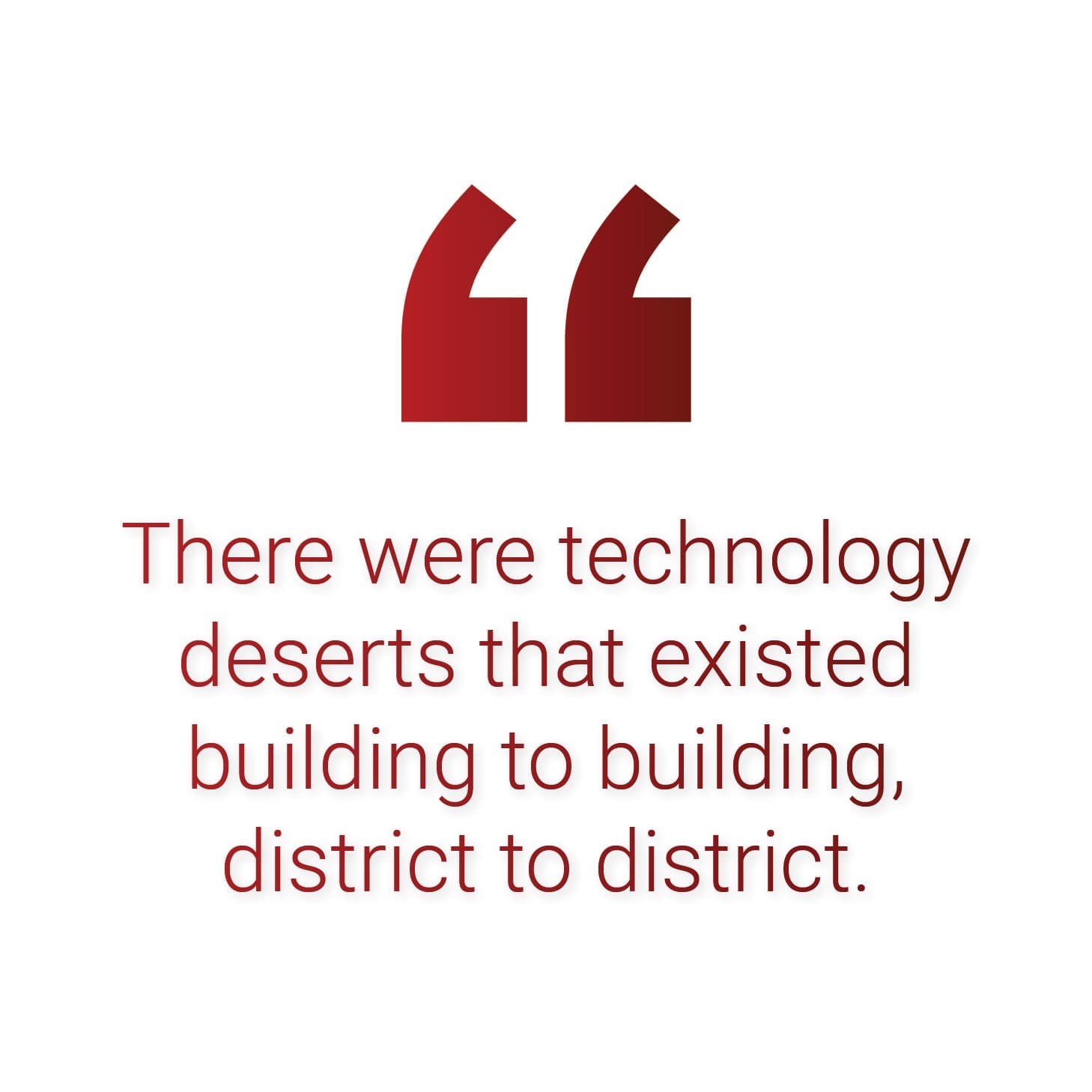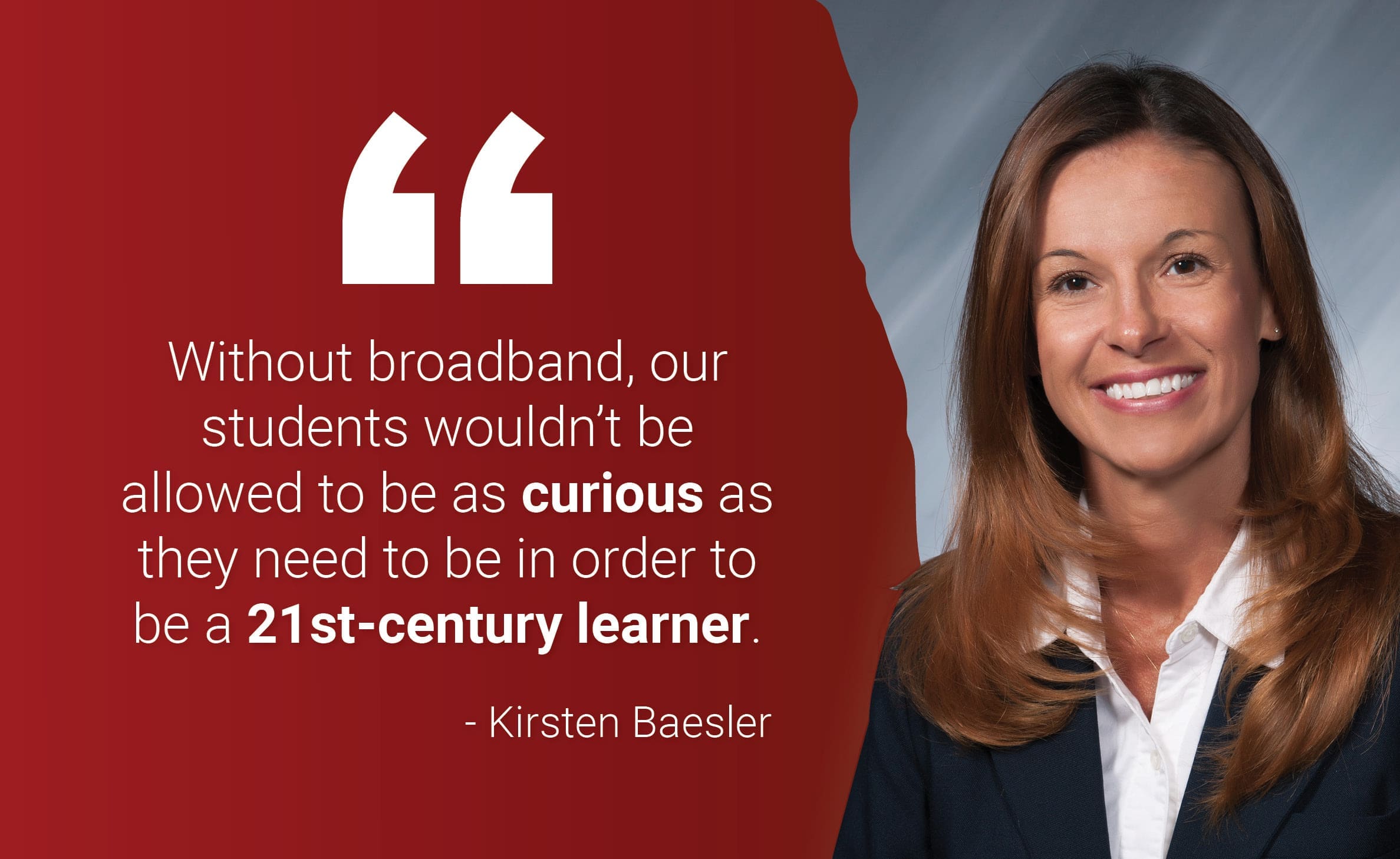
How BAND, DCN, and EduTech work together to prepare North Dakota students for the future.
In a middle school classroom in rural North Dakota, students crowd around a video camera and wave excitedly. Waving back at them from the projector screen at the front of the room is another class of students in another middle school. The two classrooms are all but mirror images of one another: same laminate desks, same pre-teen chatter, same colorful posters on the walls.
The difference? One classroom is 2,000 miles away, in Mexico.
Virtual “pen-pal” relationships are being formed in schools across North Dakota, with partner classrooms located in states and countries where North Dakota sends natural gas, coal, soybeans, and other exports. By communicating with their pen-pals through video chat, vlogs, and podcasts, students learn not only about North Dakota’s economy but the economies it impacts around the world.
Learning opportunities like these would have been unimaginable two decades ago when Kirsten Baesler served as a Technology Integration Specialist at Bismarck Public Schools. At the time, educators struggled to communicate with schools across town, let alone across the globe.
“There were technology deserts that existed building to building, district to district,” Kirsten said.
Technology deserts are areas that are not connected to the Internet or, as a result, the rest of the world. North Dakota once had some of the largest technology deserts in the country—hundred-mile stretches of state unable to enjoy the benefits of modern technology because of their rural location.
Technology deserts are areas that are not connected to the Internet or, as a result, the rest of the world. North Dakota once had some of the largest technology deserts in the country—hundred-mile stretches of state unable to enjoy the benefits of modern technology because of their rural location.
Today, broadband providers across North Dakota are working together to eliminate these technology deserts.
In 1996, 14 of the member organizations that make up the Broadband Association of North Dakota (BAND) joined forces to establish Dakota Carrier Network (DCN), enabling them to deliver the highest quality broadband across the entire state of North Dakota. BAND members that were not involved in creating DCN are considered associate DCN members, which allows them to connect into the statewide network.
While BAND serves as a representative body, providing advocacy and education for its member organizations, DCN serves as the single point-of-contact for North Dakota businesses, mobile backhaul, and government networks—including all K-12 schools, colleges and universities—using the over 40,000 miles of fiber optic cabling DCN, its owners, and associate members have deployed across the state.
“We’re just a digital form of transportation,” said Seth Arndorfer, Chief Executive Officer of DCN. “It’s the information superhighway. Instead of roads, we’re riding on fiber optic infrastructure.”
Today, Kirsten Baesler is in her second term as the State Superintendent of the North Dakota Department of Public Instruction. She oversees the 78 school districts that are operating in 470-plus buildings across the state of North Dakota and supports the nearly 120,000 students they serve.

She recognizes that educational opportunities like virtual pen-pal partnerships would not be possible for students—especially in rural areas—without high-quality, dependable broadband provided by the member organizations that make up BAND and DCN.
“Broadband has opened up the opportunity of equity for our schools,” Kirsten said. “Without that connectivity to our rural school districts, we would continue to have the ‘haves’ and the ‘have nots’ as far as classroom technology.”
Collaboration between the providers that make up DCN and BAND has paved the way for an educational technology system unlike anything else in the nation. In July 2019, DCN successfully connected every K-12 school in the state to fiber-based one-gigabit internet, making North Dakota the first state to achieve this milestone. Now all North Dakota schools, regardless of size or location, have access to the same high-speed internet.
“Students depend on a reliable high-speed internet connection for research, distance education, and to collaborate with other students across the state on projects,” Seth said. “Regardless of the size of the class, school, or district, all students deserve to have the same high-quality technology experience.”
However, widespread internet access would be of no benefit to North Dakota schools if teachers were not able to utilize it to best serve students. That is where EduTech comes in.
EduTech is a state agency under the supervision of the North Dakota Information Technology department that provides technological support and instruction to all K-12 schools in North Dakota. Resources offered by EduTech include day-to-day support for PowerSchool, the software utilized by schools to manage instruction, grading, attendance, and finances; cybersecurity support and training for teachers, school leaders, and students; and professional development to inform educators on how to use data to better inform their instruction.
While serving as State Superintendent for the past six years, Kirsten has seen how other states are navigating technology in education—and gained a new appreciation for EduTech along the way.
“I have seen first-hand how fortunate we are to have the vibrant, robust program of EduTech providing these services to all of our school districts in the state,” she said. “What they have done is help teachers leverage the tool of technology and meet students where they are at in their learning journey.”
And virtual pen-pal assignments are just one way that North Dakota schools are leveraging technology to support their curriculum. Teachers rely on high-speed broadband connections to deliver adaptive assessments on laptops and tablets. They not only allow, but encourage students to use the internet to seek out additional information.
All, Kirsten says, in the hope of preparing students for their future in an increasingly connected world.
“Without broadband, our students wouldn’t be allowed to be as curious as they need to be in order to be a 21st century learner,” she said. “We are going far beyond just measuring test scores. We’re looking for students that are engaged, that are not only turning their homework in on time but are looking for more information about that subject area. They are watching videos on YouTube to support their curiosity about a science project or an economics lesson.”
Every school in North Dakota is using technology in different ways to best suit their own students. Tioga Public Schools are working on a 1:1 initiative, which will put an internet-enabled device in each student’s hands for online learning in grades 3 through 10 this year, and grades 3 through 12 next year.
Bridgette Odegaard, Technology Director for the Tioga School District, believes that the wealth of interactive content available on the internet can be very useful in an education capacity. More research is available at each student’s fingertips.
“Before we started this project, we needed to be sure that we had a reliable broadband connection,” Bridgette said. “With so many devices accessing content on the internet, it will require a much higher demand that NCC is able to provide.”
North Dakota has evolved from a state of technology deserts into one of the most connected states in the nation, with a one-of-a-kind educational technology system that is closing the opportunity gap for rural students. To Seth, the collaborative efforts of DCN, BAND, and EduTech are a perfect example of what can be achieved when a group of people come together to work toward a common goal.
“Instead of each company trying to do their own thing, we work together to create efficiencies of scale, to leverage each other’s infrastructure,” Seth said. “I think that’s really what’s made the difference in North Dakota.”
Kirsten agrees.
“When I think about North Dakota, I think about one community with a really long main street,” Kirsten said. “It is all one community working together to make sure that our students have what they need to prepare them for their future.”

Interested in seeing the impact that NCC is making in our community? Schedule a visit with us today!


